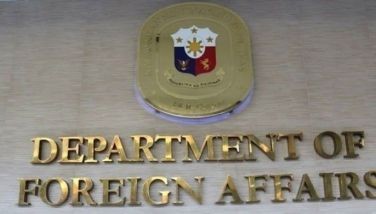House races against time to pass sin tax bill
MANILA, Philippines - The House of Representatives may hold sessions on Thursday and Friday so it could pass the sin tax reform bill before Congress adjourns this week, Speaker Feliciano Belmonte Jr. said yesterday.
The so-called sin tax bill or House Bill 5727 is being debated on the floor following its approval last week by the committee on ways and means.
The administration-backed measure aims to raise an additional P30 billion in revenues annually from the consumption of alcohol and tobacco products.
“We all are doing our best here to pass the sin tax bill and other pending measures,” Belmonte told reporters.
“We are supposed to adjourn on Wednesday but the law permits us to adjourn one or two days before and after so we will avail of that option,” he said.
He said House members would still try to pass the measure and other pending bills by Wednesday so they would not have to extend plenary sessions.
“But if we’re unable to do that, we’ll just ask the senators to hold sessions until Friday,” the Speaker said.
Revenue from the measure would be used to expand the coverage of PhilHealth.
Camarines Sur Rep. Rolando Andaya Jr., vice chairman of the committee on appropriations, said the sin tax measure should not be seen only as a revenue bill but a toll for enhancing social and health projects.
“The economic cost of smoking alone is said to be in the neighborhood of P170 billion. So if you debit the lives lost and the sickness caused by tobacco to its tax inputs, there is a deficit that is hard to bridge. This deficit is also present in alcohol in which fiscal gains are said to be cancelled by social and economic costs,” Andaya said.
He said the government has done a balancing act by installing a new tax regime that would bring down the smoking rate and at the same time push up tax collection.
“This bill picks the pockets of drinkers and smokers and puts the money into the pockets of the sick.”
Based on projections of the Bureau of Internal Revenue, ways and means committee chair Davao City Rep. Isidro Ungab said P26.87 billion of the P31.35-billion potential revenue from the measure will come from cigarettes, P3.03 billion from fermented liquors and P1.45 billion from distilled spirits.
He said that in Southeast Asia, the country is among those with the lowest tobacco excise tax rates despite its being the largest consumer of cigarettes.
Alcohol taxes on the other hand, Ungab said, are regressive, meaning low-income earners spend a greater portion of their household income on alcohol than wealthy individuals do.
Revenues from the measure will also be used for the promotion of economically viable alternatives for tobacco farmers and workers.
The amended HB 5727 provides an eight-step increase in the excise tax rates every two years effective Jan. 1, 2015 until Jan. 1, 2025 for distilled spirits, wines, fermented liquors, tobacco products, cigars and cigarettes through revenue regulations issued by the Secretary of Finance.
It also removes the price or brand classification freeze on alcohol and tobacco products.
Inequitable
Zambales Rep. Mitos Magsaysay, for her part, questioned yesterday the “inequitable” tax treatment between tobacco and alcohol products in the sin tax reform bill.
During the debates on the measure, Magsaysay said while the revised House Bill 5727 would increase the tax on low-priced cigarettes by 700 percent, it would levy only a 32-percent adjustment on beer.
In fact, medium-priced and high-priced beer would enjoy a virtual tax holiday with a zero tax increase for two years, she said.
“Unlike tobacco products where the mid, high, and medium were merged into top tier (premium), the classification of mid-priced beer brands are merged with the low-tier segment under the amended Bill 5727,” she said.
“Thus, beer products that are currently classified as mid-priced brands and paying a tax rate of P15.49 will be considered low-priced brands and will continue to pay a tax of P15.49 until 2014,” she said.
“The same is true for high-priced beer brands which will continue to pay a tax of P20.57 until 2014. Otherwise stated, mid-priced and some high-priced beer brands will only start paying a higher tax rate by 2015. They will enjoy a tax holiday instead of a tax increase for two years,” she added.
Magsaysay stressed that the rate of tax increases for alcohol and tobacco products should be the same.
She called for an equitable sharing of tax burden between alcohol and tobacco products, saying overtaxing one product over the other is unreasonable and unfair.
She said the unequal tax treatment goes against the government’s advocacy of higher levies to discourage consumption of “sin” products, which are harmful to human health, and bring down taxpayers’ cost for smoking-and drinking-related ailments.
She said proponents of higher sin taxes have failed to explain why they are loading bigger tax increases on cigarettes than on fermented liquor like beer.
Magsaysay is the second House member to question the ways and means committee chairman on Bill 5727.
Last week, Cagayan de Oro City Rep. Rufus Rodriguez opposed the 700-percent tax increase on tobacco products.
Meanwhile, Health Secretary Enrique Ona led the signing of a manifesto that urges senators to introduce improvements in the sin tax reform bill for tobacco and alcohol.
Anthony Leachon, Health department consultant for non-communicable diseases, said former DOH secretaries Alberto Romualdez and Esperanza Cabral will also sign the manifesto. – Jess Diaz, Sheila Crisostomo
- Latest
- Trending































